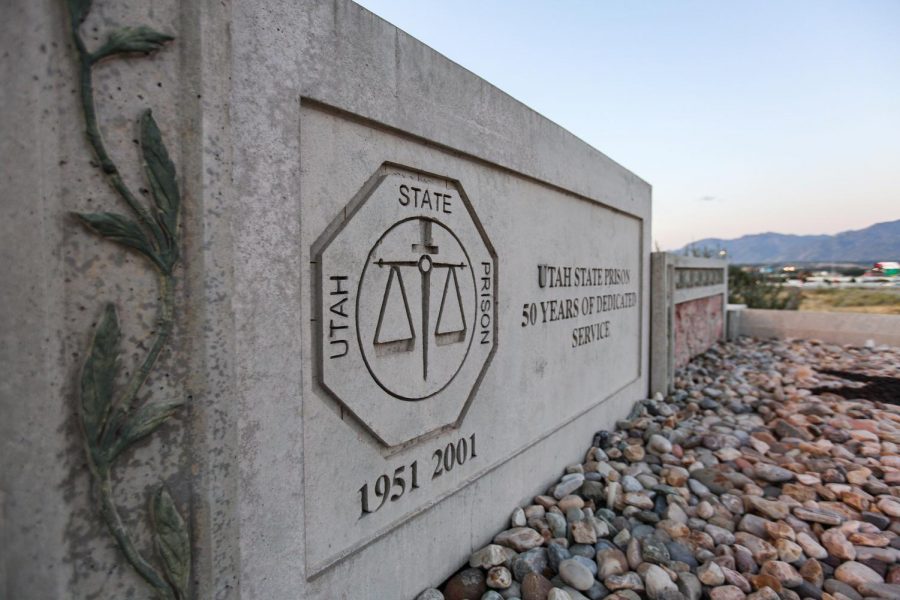Cushman: We Need to Start Advocating for Inmates and Their Families
The front gate of the Utah State Prison in Draper, UT. (Photo by Justin Prather | The Daily Utah Chronicle).
November 18, 2020
Inmates’ families face unique struggles, from extra expenses to emotional and mental health issues. As cases of COVID-19 have exploded in Utah prisons, those families have faced extra stress, worrying about the safety and lives of their loved ones. There are over 600 confirmed cases in the Utah State Prison and the Central Utah Correctional Facilities with multiple inmate fatalities due to virus-related complications, leading to serious concerns about prison conditions. It shouldn’t take such unsafe living conditions to seriously address the conditions forced on inmates and their families — but with the spotlight now on those families — it is time to address the obstacles they face.
Undue Burden
For inmates’ families, simply showing love to their jailed family members is difficult. They are subject to a huge financial burden. There are hidden costs to having a jailed family member, from gas money for travel to legal fees for visits to prison living expenditures to lost income. Even contacting incarcerated loved ones involves a fee as states often charge a fee from calls within a prison. Something so easy and regular for most of us, calling our family, results in a charge to prisoners and their families which makes it harder for families to stay in contact.
In addition to the financial burden, there is an emotional cost to having a family member in jail. The National Criminal Justice Reference Service conducted a study that showed communication between families of inmates and incarcerated individuals faced strain as a result of incarceration. Loved ones felt the need to hide struggles from one another to not cause worry. The physical separation that comes with a prison sentence is incredibly damaging to familial relationships. But the pandemic has made in-person visits even more limited and families will only find it harder to communicate and support one another.
Three million children nationwide have at least one parent in jail. These children are more likely to enter the foster care system, have contact with the juvenile justice system, perform worse in school and face mental health issues as a result of their parent’s incarceration. Like the children of inmates, prisoners themselves and other family members see increased rates of depression as they adjust to separation and loss. Now, with COVID-19 making its rounds through Utah prisons, those families are facing additional stress as they have to worry about the safety of their loved ones on top of the other emotional burdens.
The Pandemic In Prison
In April, the ACLU tried to sue Utah prisons for having an inadequate response to the global pandemic, but the litigation was ultimately dismissed by the Utah Supreme Court. Though the lawsuit didn’t lead anywhere, many families of prisoners are still concerned that safety standards are not adequate to protect inmates living in close quarters.
Before outbreaks began, pandemic guidelines were loosely enforced in prisons, with some guards refusing to wear masks around inmates and not enough room to social distance or quarantine COVID-positive inmates. Some inmates were even denied masks when they requested them. A lack of widespread testing also made it possible for asymptomatic inmates with COVID-19 to spread the virus throughout facilities.
Some Utah prisons also charge inmates for doctor visits, meaning that financially strained individuals and families will struggle to receive adequate health care despite the very real threat of the pandemic. Executive Director of the Utah Department of Corrections, Mike Haddon, has since assured the public that all prisoners are being provided masks and guards are being supplied with protective gear, but the lack of care given to the safety of inmates prior to outbreaks and the obstacles in the way of inmates receiving care is cause for concern.
Many family members have said that their loved ones are calling them terrified of not receiving care. One woman married to an inmate told the Salt Lake Tribune that her husband spent hours lying in his bed crying in pain and became rapidly weak after testing positive. Seeing the judicial system’s slow response to the pandemic, hearing the fears of their loved ones and the additional expenses for inmate healthcare all add to the burden that the families face.
A New Standard
While addressing the concerns of inmates’ families, Haddon emphasized how important it is that “people who are incarcerated have a voice.” Haddon is exactly right. Prisoners are locked away, out of sight and out of mind. They often do not have a say in their living standards, something that has become especially clear with a slow response to the pandemic by Utah jails. Moving forward, we need to make sure that prisoners have outlets to be heard and ask for improved safety and health standards.
Prisoners’ families are an instrumental support network for those in jail. Which is important for inmates but also the rest of society as studies show that inmates who keep in contact with family during their sentence have a much lower recidivism rate. These families face so many obstacles to contacting and maintaining healthy relationships with their incarcerated loved ones. It is essential that the judicial system is more transparent with family members about the safety standards and living conditions in jails and that contact with family members becomes more accessible.








